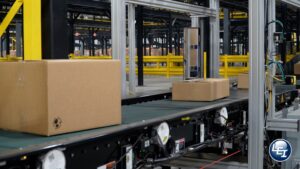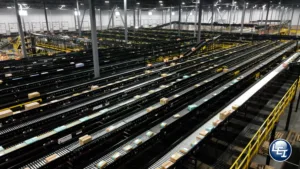Table of Contents
In the world of automated material handling, conveyor systems are vital. They provide reliable, efficient methods to move goods through a facility, reducing manual labor, enhancing speed, and improving safety. At Lafayette Engineering, our conveyor systems are engineered for precision, durability, and efficiency, meeting the unique needs of various industries.
Conveyor systems operate on a straightforward principle: to transport items from one location to another seamlessly. However, the configurations and technologies involved in each system can vary widely. Key components typically include belts, rollers, pulleys, drive units, and support structures, all designed to support different types of loads, environments, and processes.

Types of Conveyor Systems and Their Applications
- Belt Conveyors: Widely used in industries, belt conveyors offer a versatile and cost-effective solution for transporting items of varying weights and sizes. At Lafayette Engineering, our belt conveyors are constructed with durable materials that can handle both standard and heavy-duty tasks, suitable for applications ranging from warehouses to manufacturing lines.
- Roller Conveyors: Ideal for handling solid items, roller conveyors are common in settings like distribution centers and assembly lines. Our roller conveyor systems are customized to meet specific operational needs, whether they require gravity-driven or powered options for optimal efficiency.
- Specialty Conveyors: Overhead, magnetic, and chain conveyors address specialized needs in industries that demand unique handling solutions. Overhead conveyors, for example, maximize floor space, while magnetic systems securely move metal items. Lafayette Engineering’s expertise ensures that each system is designed with the exact needs of our clients in mind.
- Modular Conveyors: For flexible operations, modular conveyors allow quick reconfiguration to adapt to changing demands. These systems are invaluable in dynamic environments like e-commerce and logistics, where agility is essential.
Key Considerations in Conveyor System Design
Choosing the right conveyor system goes beyond picking components; it requires a comprehensive understanding of the operational requirements. At Lafayette Engineering, our approach involves a detailed assessment of factors like:
- Load Size and Weight: Ensuring the conveyor system can handle the dimensions and weight of items.
- Movement Distance and Flow Rate: Determining the length of transport and speed necessary to meet throughput goals.
- Space Constraints and Facility Layout: Adapting the system to available space, allowing smooth integration into existing workflows.
- Safety and Ergonomics: Addressing safety measures and user comfort, particularly in systems with manual interaction.
Why Choose Lafayette Engineering for Conveyor Systems?
With years of expertise, Lafayette Engineering is a trusted name in material handling solutions. Our team provides a full spectrum of services, from initial design and planning to installation, maintenance, and upgrades. We collaborate closely with each client, tailoring conveyor systems that align with their specific requirements, operational goals, and budget.
Whether you’re looking to streamline operations, boost productivity, or reduce workplace risks, Lafayette Engineering has the knowledge and capabilities to deliver a solution that enhances efficiency while minimizing downtime and operational costs. We’re here to guide you through every step, ensuring a seamless transition to a more efficient material handling process.
Background on Lafayette Engineering
Established in 1989 by Bruce and Beth Robbins, Lafayette Engineering has evolved from a modest controls company in Lexington, Kentucky, into a leading provider of industrial conveyor systems. Relocating to Danville, Kentucky, in 1990 to foster a family-oriented business environment, the company has consistently expanded its expertise and services. By 2000, Lafayette Engineering had doubled in size, inaugurating its own Panel Fabrication Shop and Control Cabinet Assembly area.
In 2012, the company moved to a 60,000-square-foot facility, featuring a test loop for pre-installation control testing and product development. The establishment of Southern Conveyor in 2013 and the acquisition of Century Conveyor Systems in 2017 extended their reach across the U.S. In 2022, Lafayette Engineering introduced its first patented product, the Lafayette Magnetic Sortation (LMS) system, marking its entry into manufacturing. With additional locations in Los Angeles, Atlanta, and New Jersey, the company continues to provide comprehensive material handling solutions nationwide.




